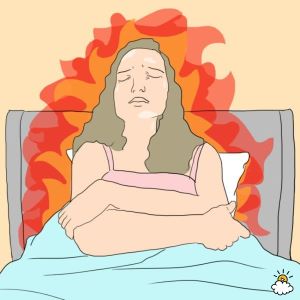Postmenopausal Hot Flashes
By Reed Mangels, PhD, RD
Hot flashes are the most common menopause-related discomfort with an estimated 75% of women in North America experiencing them (1). They have been described as a sudden feeling of heat throughout one’s body accompanied by profuse sweating and flushing. According to the North American Menopause Society, although their exact cause isn’t known, they are thought to be the result of changes in the part of the brain that regulates body temperature. Hot flashes can lead to a loss of sleep and reduced quality of life.
A recent study examined the effects of a combination of a low-fat vegan diet and a serving of cooked soybeans daily on the occurrence of hot flashes (2). Postmenopausal women aged 40 to 65 years who reported at least two moderate-to-severe hot flashes per day were enrolled in the study. They were randomly assigned to one of two groups. The first group (Intervention) was asked to avoid all animal-derived foods, markedly reduce their consumption of oils and high fat foods such as nuts and avocados, and eat a half cup of soybeans daily for the 12 week study period. The other group (Control) was asked to continue their usual diet throughout the study. Study participants used a mobile app to record the frequency and severity of hot flashes.
Over the 12 week study period, the Intervention group reported eating less fat, saturated fat, and cholesterol and more fiber than they ate before the study. This group lost an average of 8 pounds; the Control group averaged less than half a pound of weight loss. During the study period, the Intervention group had hot flashes and moderate-to-severe hot flashes less frequently than the Control group. For example, moderate-to-severe hot flashes in the Intervention group went from 5 per day, on average, to less than one a day compared to a decrease from 4.4 moderate-to-severe hot flashes per day to 2.9 per day in the Control group. Among study participants who had at least 7 moderate-to-severe hot flashes daily at the start of the study, subjects in the Intervention group went from 10.6 to 0.7 per day and those in the Control group went from 9 to 5.8 per day.
Due to the design of the study, it’s not possible to say if the results were due to the vegan diet, the low-fat nature of the diet, the soybeans, or a combination of two or more of these factors. For now, we can say that a vegan, low-fat diet accompanied by a half cup of cooked soybeans each day was associated with a significant reduction in the number of daily hot flashes that participants experienced.
References
- The North American Menopause Society. Menopause FAQS: Hot flashes. https://www.menopause.org/for-women/menopause-faqs-hot-flashes. 2023.
- Barnard ND, Kahleova H, Holtz DN, et al. A dietary intervention for vasomotor symptoms of menopause: a randomized, controlled trial. Menopause. 2023;30(1):80-87.
To read more about menopause see:
Nutrition Hotline on Hot Flashes
The contents of this website and our other publications, including Vegetarian Journal and Vegan Journal, are not intended to provide personal medical advice. Medical advice should be obtained from a qualified health professional. We often depend on product and ingredient information from company statements. It is impossible to be 100% sure about a statement, info can change, people have different views, and mistakes can be made. Please use your best judgment about whether a product is suitable for you. To be sure, do further research or confirmation on your own.

